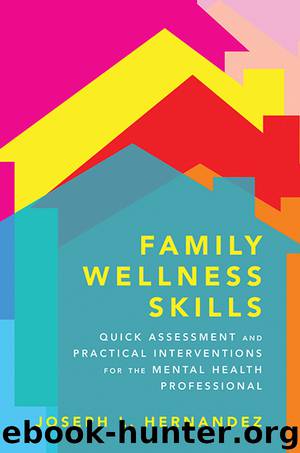Family Wellness Skills by Joseph Hernandez

Author:Joseph Hernandez
Language: eng
Format: epub
Publisher: W. W. Norton & Company
4
Listen
Be a Follower
THE FAMILY WELLNESS model asserts that the ability to listen to others, and to care about what they are saying, is the second of three foundational skills necessary for an individual to be psychologically healthy. Listening is a gift. When we give it without any expectation of personal gain, it becomes the gift that keeps on giving.
The capacity to listen to another person is an important step in the development of intimacy in any relationship. When individuals habitually do not listen to others, they demonstrate that they are totally self-absorbed. They may have acquaintances, but they will likely not have friends. People who know how to listen likely know how to play well with others. Good listeners know how to be followers. They attend to the needs of others. Those actions are generally reciprocated and friendship has fertile ground in which to grow.
A conversation requires each person to know how to speak up as well as how to listen. Healthy interpersonal interaction requires the ability to listen to others. There is, however, a difference between listening and hearing. In Spanish, two totally separate words are used to differentiate between hearing and listening: oír and escuchar. The word oír refers to simply hearing sounds or spoken words. We may hear (oír) something or someone when conversation is not involved. For example, we may oír a door creaking or the words a person is saying without fully understanding the meaning behind the words or sounds. On the other hand, when we listen to (escuchar) someone, we go beyond hearing to actually understanding the depth of the words’ meaning, the feelings or intent of the message, and the energy level of the person speaking. To listen to another person is to make an important and intimate connection with that other person, even if we disagree with the other. To listen to someone does not mean that we necessarily agree with that person.
Most people want to be heard, to be understood, and to be agreed with. Good listeners seek to meet the first two expectations on that list. These two parts of listening are required in healthy interpersonal relationships. Complying with the third item is optional. Hearing someone denotes simply being aware of what the other person is saying. Being on the same page regarding the words exchanged is important in a conversation. Only hearing the words, however, is incomplete listening. To understand another means, “I get you.” We hear the words and are aware of what they are saying at an emotional level. True listening requires that we attempt to achieve a deeper understanding of what the other person is saying at the word level, at the emotions level, and at the energy level. The words are the doorway to a person’s thoughts. The feelings are the doorway to the emotions. The energy an individual exudes is the doorway to the person. When we truly listen to another, we are able to plumb the depths of who that person is, which is what intimacy is (“into-me-see”; see Figure 4.
Download
This site does not store any files on its server. We only index and link to content provided by other sites. Please contact the content providers to delete copyright contents if any and email us, we'll remove relevant links or contents immediately.
The Art of Thinking Clearly by Rolf Dobelli(10444)
The 5 Love Languages: The Secret to Love That Lasts by Gary Chapman(9782)
Mindhunter: Inside the FBI's Elite Serial Crime Unit by John E. Douglas & Mark Olshaker(9313)
Becoming Supernatural by Dr. Joe Dispenza(8196)
Nudge - Improving Decisions about Health, Wealth, and Happiness by Thaler Sunstein(7689)
The Road Less Traveled by M. Scott Peck(7592)
Mastermind: How to Think Like Sherlock Holmes by Maria Konnikova(7314)
Enlightenment Now: The Case for Reason, Science, Humanism, and Progress by Steven Pinker(7305)
Win Bigly by Scott Adams(7183)
The Way of Zen by Alan W. Watts(6594)
Factfulness: Ten Reasons We're Wrong About the World – and Why Things Are Better Than You Think by Hans Rosling(4730)
The State of Affairs by Esther Perel(4710)
Gerald's Game by Stephen King(4640)
Man's Search for Meaning by Viktor Frankl(4573)
The Confidence Code by Katty Kay(4248)
Thinking in Bets by Annie Duke(4216)
The Healing Self by Deepak Chopra(3568)
Hidden Persuasion: 33 psychological influence techniques in advertising by Marc Andrews & Matthijs van Leeuwen & Rick van Baaren(3549)
The Worm at the Core by Sheldon Solomon(3483)
